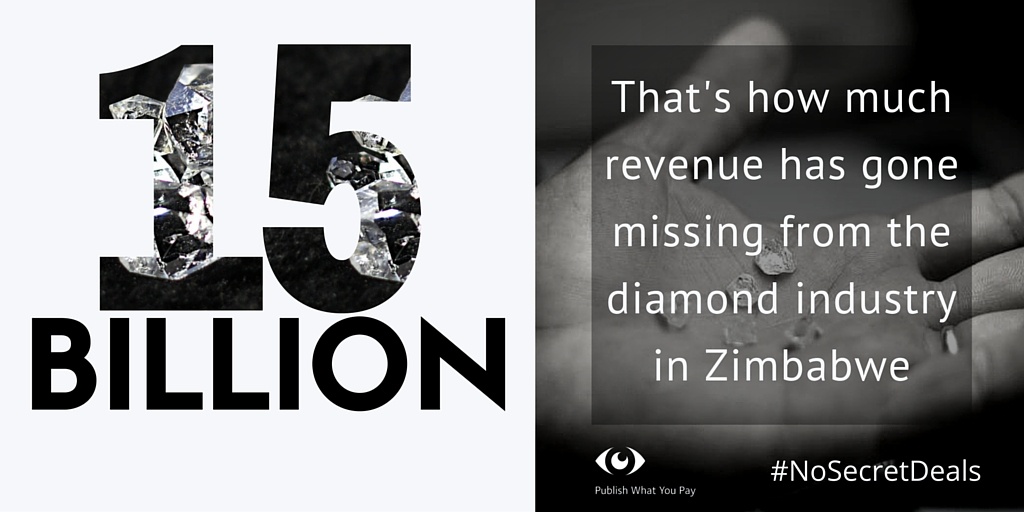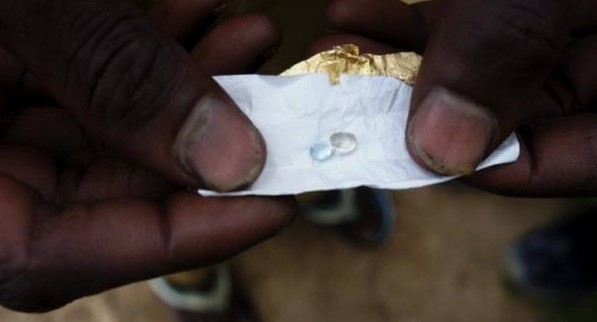When President Mugabe announced on his 92nd birthday, 21st February 2016, that $15 billion worth of revenues generated by the diamond industry had gone missing, the majority of Zimbabweans believed him. Zimbabwe is among the world’s ten largest producers of diamonds. It is also one of the world’s poorest countries, ranked 156 in the 2014 Human Development Index. Every year, it extracts 4,7 million carats of diamonds, enough to produce millions of engagement rings for enamoured couples around the world. But do people in Zimbabwe benefit from this natural wealth? The answer is a resounding no.
Zimbabwe is not an isolated anomaly. Revenues generated by mining around the world have gone missing for years, the results of a vast and complex web made of illicit financial flows, tax evasion and disrespect for the rule of law. The first to bear the brunt of corruption are citizens of resources-rich countries, especially local communities who often derive little benefit from mining yet suffer its environmental and social impacts. In Zimbabwe’s community of Marange in the Manicaland province, possibly home to one of the world’s richest diamond deposits, schools, clinics and paved roads are scarce.
I just came back from Harare, where I met with outstanding anti-corruption activists, who work to promote transparency and accountability in the diamond and gold mining sectors. Contrary to Western perception, there is a vibrant civil society sector in Zimbabwe promoting good governance as well as social, economic and environmental rights. They are hard at work to track these missing $15 billion. One of them, Darlington Farai Muyambwa, one of President Obama’s Young African Leaders Initiative (YALI) fellows, and Publish What You Pay’s national coordinator in Zimbabwe is working closely with colleagues at the renowned Zimbabwe Environmental Law Association (ZELA) to train activists in following the money from mining sites to the state’s coffer. It is no easy task. Last week, fifteen other activists from France, Indonesia, Mozambique, the Philippines, UK, US and Zambia came to lend a hand to Darlington. These “data extractors“ spent three days in Harare digging into and analysing financial data in publicly available reports that detail the payments made by mining companies to governments (such as royalties, taxes, fees, etc.). They are finding discrepancies between what companies report they are paying and what governments report they are receiving. The difference amounts to vast sums of money going missing and ending up in tax havens, robbing countries of much needed revenues for development and poverty alleviation (Panama Papers anyone?). Meanwhile, Zimbabwe, which adopted the US$ as its currency in 2009, is running out of cash. Most ATMs in Harare last week were empty.
The extractive sector (oil, gas, mining) is one of the industrial sectors most prone to corruption. It comes ahead of construction and transportation according to a recent OECD report on corruption. While many governments, companies and civil society organisations are increasingly coming together to increase transparency in the sector, with the Extractive Industries Transparency Initiative and the EU Directives on Accounting and Transparency as steps in the right direction, Zimbabwe has not kept pace with other governments in disclosing mining contracts and revenues. It showed interest in developing its own domestic version of the EITI the Zimbabwe Mining Revenue Transparency Initiative (ZMRTI) in 2011. But that initiative was abandoned shortly after. The government is party to the Kimberley process but there remains conflict between the position of government and that of civil society, creating a rift in opinions on how diamond mining affects communities in Zimbabwe.
The coming few months present a rare window of opportunity to make minerals exploration more transparent, accountable and sustainable: the Parliament is currently conducting a participatory revision of the 1961 Mines and Mineral Act, with a new draft bill under consideration. Civil society organisations have already noted that the new draft bill fails to ensure mining contract transparency, disaggregation of revenues by companies and gender equity and are asking for further amendments.
This is an interesting time in Zimbabwe. Besides the flurry of activities around this new draft bill, digital activism seems to have reached a peak in the past couple of weeks. #Thisflag hashtag is being used by hundreds of Zimbabweans to demand accountability by the government to citizens. The campaign has gone viral on social media, with people voicing their concern on issues ranging from the lack of social services to institutionalised corruption.
Citizens of Zimbabwe have the right to know the terms under which their natural resources are being exploited. They also have the right to benefit from their exploitation. More people are now demanding accountability from and asking questions to their government officials. Watch that space!
Follow Elisa Peter on Twitter: www.twitter.com/ElisaPeter
This blog was originally posted on the Huffington Post, find it by clicking here.












